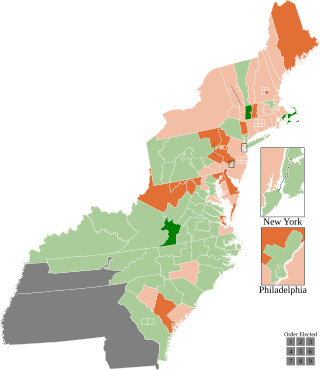
The 1796 United States presidential election was the third quadrennial presidential election of the United States. It was held from Friday, November 4 to Wednesday, December 7, 1796. It was the first contested American presidential election, the first presidential election in which political parties played a dominant role, and the only presidential election in which a president and vice president were elected from opposing tickets. Incumbent vice president John Adams of the Federalist Party defeated former secretary of state Thomas Jefferson of the Democratic-Republican Party.
Absalom Tatom was a U.S. Congressman from North Carolina from 1795 to 1796.
William Francis Strudwick was a U.S. Representative from the state of North Carolina between 1796 and 1797.

The 1796–97 United States House of Representatives elections took place in the various states took place between August 12, 1796, and October 15, 1797. Each state set its own date for its elections to the House of Representatives. The size of the House increased to 106 seats after Tennessee became the 16th state to join the union. The first session of the 5th United States Congress was convened on May 15, 1797, at the proclamation of the new President of the United States, John Adams. Since Kentucky and Tennessee had not yet voted, they were unrepresented until the second session began on November 13, 1797.

The 1794–95 United States House of Representatives elections were held on various dates in various states between August 25, 1794, and September 5, 1795 (Kentucky). Each state set its own date for its elections to the House of Representatives before the first session of the 4th United States Congress convened on December 7, 1795. They were held during President George Washington's second term. Elections were held for all 105 seats, representing 15 states.
The 1796 United States Senate special election in New York was held on November 9, 1796, by the New York State Legislature to elect a U.S. Senator to represent the State of New York in the United States Senate.

The 1796–97 United States Senate elections were held on various dates in various states. As these U.S. Senate elections were prior to the ratification of the Seventeenth Amendment in 1913, senators were chosen by state legislatures. Senators were elected over a wide range of time throughout 1796 and 1797, and a seat may have been filled months late or remained vacant due to legislative deadlock. In these elections, terms were up for the senators in Class 1.

The 1798 United States House of Representatives elections in New York were held from April 24 to 26, 1798, to elect ten U.S. Representatives to represent the State of New York in the United States House of Representatives of the 6th United States Congress.

The 1808 United States House of Representatives elections in New York were held from April 26 to 28, 1808, to elect 17 U.S. Representatives to represent the State of New York in the United States House of Representatives of the 11th United States Congress. At the same time, a vacancy was filled in the 10th United States Congress.

The 1814 United States House of Representatives elections in New York were held from April 26 to 28, 1814, to elect 27 U.S. Representatives to represent the State of New York in the United States House of Representatives of the 14th United States Congress.

Elections to the House of Representatives were held in Pennsylvania on October 14, 1794, for the Fourth Congress.

Elections to the United States House of Representatives were held in Pennsylvania on October 9, 1798, for the 6th Congress.

Elections to the United States House of Representatives were held in Pennsylvania on October 11, 1796, for the 5th Congress.

A special election was held in Pennsylvania's 5th congressional district on October 11, 1796 to fill a vacancy caused by the resignation of Daniel Hiester (DR) on July 1, 1796
A special election was held in Massachusetts's 1st congressional district on September 5, 1796 and November 21, 1796 to fill a vacancy caused by the resignation of Theodore Sedgwick (F) upon his election to the Senate
A special election was held in Massachusetts's 10th congressional district on August 1, 1796 and September 12, 1796 to fill a vacancy left by the resignation of Benjamin Goodhue (F) in June, 1796. Goodhue had resigned upon being elected to the Senate.

A special election was held in North Carolina's 4th congressional district on August 4, 1795 to fill a vacancy left by the death of Alexander Mebane (DR) on July 5, 1795, before the start of the 1st session of the 4th Congress.
A special election was held in Rhode Island's at-large congressional district on November 15, 1796 to fill a vacancy left in both the 4th and 5th Congresses by the resignation of Benjamin Bourne (F).

A special election was held in Maryland's 2nd congressional district on April 18, 1796, to fill a vacancy left by the resignation of Gabriel Duvall (DR) on March 28, 1796.

The 1796 United States elections elected the members of the 5th United States Congress. The election took place during the beginning stages of the First Party System, as the Federalist Party and the Democratic-Republican Party clashed over the states' rights, the financial policies of Treasury Secretary Alexander Hamilton, and the recently ratified Jay Treaty. The Federalists maintained control of the Senate, and won control of the House and the presidency.











